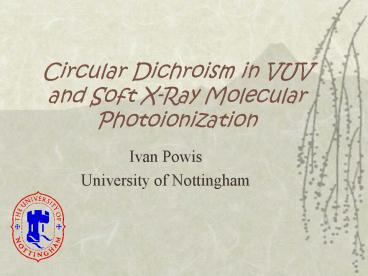Circular Dichroism in VUV and Soft XRay Molecular Photoionization - PowerPoint PPT Presentation
1 / 38
Title: Circular Dichroism in VUV and Soft XRay Molecular Photoionization
1
Circular Dichroism in VUV and Soft X-Ray
Molecular Photoionization
- Ivan Powis
- University of Nottingham
2
Outline
- Chirality (Handedness)
- biological
- molecular
- Photoionization of Chiral Molecules
- Experimental Circular Dichroism Angular
Distribution of randomly oriented chiral
molecules - Valence Shell Ionization Camphor
- C 1s core Ionization - Camphor
- Theoretical Understanding
3
Leonardo da Vinci
- Leonardo had many talents artist, scientist,
engineer, anatomist, architect.. - He made important studies of proportion and
symmetry
4
Left and Right Handedness
John the Baptist By Leonardo da Vinci
Right hand and left hand are non-superimposable
Right hand is a mirror image of left hand
5
Chirality in Micro-Organisms
N. pachy - The most abundant planktonic
foraminifer (microscopic marine organism) at high
latitudes
- Neogloboquadrina pachyderma
- Coils left when sea temperature lt 8 C
- Coils right when sea temperature gt 8 C
6
Chiral Molecules
7
The Homo-Chirality of Life
- Amino Acids are the chiral molecular building
blocks of life. - Both L- and D- forms can exist, but only the
L-form occurs naturally in living organisms
Alanine The smallest chiral Amino Acid
8
- Discriminate chiral objects by interaction with
chiral environment or other chiral objects - Since life is chiral it frequently discriminates
between chiral enantiomers - Pharmaceuticals
- Odours
9
Chiral Odour Molecules
See- http//www.leffingwell.com/chirality/chirali
ty.html
S-() carvone - caraway
R-(-) carvone - spearmint
10
Circular Dichroism
- Difference in response to left-right circularly
polarised radiation - CD in total absorption
- Electric-magnetic dipole interaction
- Weak (lt0.01)
- CD in differential cross-section is more promising
11
Photoelectron Angular Distributions
(also for achiral molecules)
p0 linear polarization p1 left/right
circularly polarized
1 I. Powis, J. Chem. Phys., 112, 301 (2000) I.
Powis, J. Phys. Chem. A104, 878 (2000).
D-Glyceraldehyde1
12
Circular Dichroism in Angular Distribution of
photoelectrons
I. Powis, J. Chem. Phys., 112, 301 (2000).
- Electric dipole approximation
- P1 term arises from interference between l, l1
partial waves
13
Camphor
- Rigid bicyclic carbonyl
- HOMO is nO lone pair
- Solid at room temperature
- Heat to approx. 120 to obtain vapour pressure
- Problem of condensation !
14
Ion Image
- Camphor
- (135 C)
- 2 bar Ar
- 50 ?m nozzle
15
SU5 at Super-ACO
16
SU5- Circularly Polarized VUV
- 6-40 eV
- Fully variable polarization
- Polarimeter
- Gas Filter
17
Undulators for circularly polarized light
- A pair of horizontal and vertical magnetic arrays
with a phase shift between the poles creates
helical electron beam hence helical (circularly
polarised radiation) is emitted
18
The SU5 dedicated polarimeter
19
Polarization on SU5
20
Electron-Ion Coincidence Imaging (Valence
Ionization)
21
Position Sensitive Delay Line Anode
NI Data Acq Board
- Spatial resolution better than 80 ?m as inferred
from the mask
xxt1-xt2
- High linearity across the surface
yyt1-yt2
22
Camphor Valence PES
E. E. Rennie, I. Powis, U. Hergenhahn, O.
Kugeler, G. Garcia, T. Lischke, and S. Marburger,
J. Elec. Spectrosc. Rel. Phen. 125, 197 (2002).
23
(a)
(b)
(c)
y (mm)
x (mm)
x (mm)
x (mm)
Coincident ion corrected electron image
Ion image
Raw electron image
24
Dichroism Images Camphor 9.2 eV
G. A. Garcia, L. Nahon, M. Lebech, J.-C. Houver,
D. Dowek, and I. Powis, J. Chem. Phys. 119 xyz
(2003)
25
Camphor CDAD 9.2 eV
G. A. Garcia, L. Nahon, M. Lebech, J.-C. Houver,
D. Dowek, and I. Powis, J. Chem. Phys. 119 xyz
(2003)
26
The new AR-imaging PEPICO DELICIOUS
Dichroism and ELectron Ion Coincidences
in IOnization Using Synchrotron
27
Electron/Ion VMI Spectrometer
Repeller
Electrode de masse
PSD
Lentille de Einzel
Plaque déflectrice
Extracteur
28
He ions _at_ 25 eV
Ar e- _at_ 16 eV
29
hv 9.6 eV
hv 10.3 eV
R- Camphor
S-Camphor
30
Camphor CDAD Images _at_10.3 eV
Polar Basex Inversion 3D
R-()
S-(-)
HOMO
HOMO-1
31
Camphor Valence CDAD Experimental Results
32
Camphor CO C1s PES
33
CDAD in Core Ionisation of Camphor
Results obtained in the variable polarisation
UE56-PMG2 at BESSY II (Berlin)
34
BESSY Electron Spectrometer
35
Camphor Core CDAD
36
Further Work
- This effect is not just a feature of the camphor
molecule, - it appears to be more general
37
Conclusions
- (Anti-)symmetry of effect (change with helicity
of light, molecule) as expected from pure
electric dipole approx. - This also precludes significant non-dipole
contributions (different symmetry for E1-E2,
E1-M1) - Magnitude up to 12 asymmetry seen (cf
absorption CD of lt 0.01) - Final state scattering effect (since C 1s
spherical orbital) - Expect to be general phenomenon (eg carvone) and
not associated with CO group - Rapid polarization switching will improve S/N
38
Acknowledgements
- L Nahon
- D Dowek
- J-C Houver
- M Lebech
- Gustavo Garcia
- C Harding
- U Hergenhahn
- E Rennie
- O Kugeler
- T Lischke
- EPSRC
- EU
- University of Nottingham
- The Royal Society
- INTAS































